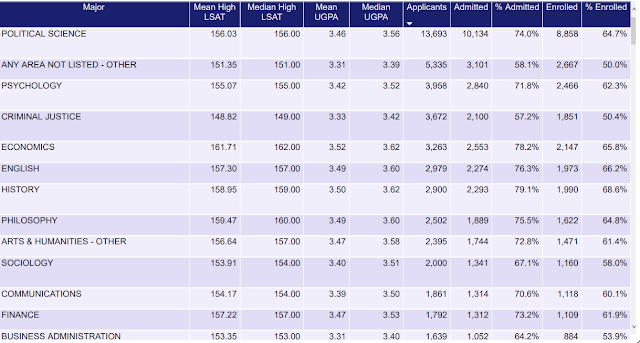Yes, NBER charges for downloads of working papers, but you
can watch some recent meetings for free. By the way, it has also been my
experience that you can usually find ungated versions of most NBER working papers
if you look around.
I think both the Race and Stratification Economics and the
Development of the American Economy meetings should be of interest to readers
of this blog.
The final presentation at the Race and Stratification
meeting is University of Mary Washington economics alum Lavar Edmonds, who is
currently working on a Ph.D. in economics at Stanford, presenting his research
on the impact of HBCU trained teachers.
I also liked that the Race and Stratification meeting about how one could incorporate race and stratification economics into introductory
economics courses.
NBER
Race and Stratification Working Group on YouTube
https://www.nber.org/conferences/race-and-stratification-working-group-spring-2023
Caste-based and Racial Wealth Inequality in India and the
United States
Ishan Anand, Indian Institute of Technology Delhi
Discussants:
Ellora Derenoncourt, Princeton University and NBER
Ashwini Deshpande, Ashoka University
Perceptions of Racial Gaps, their Causes, and Ways to Reduce
Them
Matteo F. Ferroni, Boston University
Stefanie Stantcheva, Harvard University and NBER
Discussants:
Michael Kraus, Yale University
Candis Watts Smith, Duke University
Unequal Gradients: Sex, Skin Tone, and Intergenerational
Economic Mobility
Luis A. Monroy-Gómez-Franco, University of Massachusetts,
Amherst
Roberto Vélez-Grajales, Centro de Estudios Espinosa Yglesias
Gastón Yalonetzky, Leeds University
Discussants:
Art Goldsmith, Washington and Lee University
Chantal Smith, Washington and Lee University
Teaching Discrimination in Introductory Economics: An
Approach Incorporating Stratification Economics
Jorgen M. Harris, Occidental College
Mary Lopez, Occidental College
Complementary Investments Over the Life Course and the
Black-White Earnings Gap
Sonia R. Bhalotra, University of Warwick
Damian Clarke, Universidad de Chile
Atheendar Venkataramani, University of Pennsylvania and NBER
Estimating Disenfranchisement in U.S. Elections, 1870-1970
Jeffery A. Jenkins, University of Southern California
Thomas R. Gray, University of Texas at Dallas
The Determinants and Impacts of Historical Treaty-Making in
Canada
Donn. L. Feir, University of Victoria
Rob Gillezeau, University of Toronto
Maggie E.C. Jones, Emory University and NBER
A Simple Model of Group Conflict, Inequality and
Stratification
Daniele Tavani, Colorado State University
Brendan Brundage, Colorado State University
Discussants:
Pablo Beramendi, Duke University
Patrick L. Mason, University of Massachusetts Amherst
Racial Disparities in the Tax Treatment of Marriage
Janet Holtzblatt, Tax Policy Center
Swati Joshi, Brookings Institution
Nora R. Cahill, Brookings Institution
William Gale, Brookings Institution
Not so Black and White: Uncovering Racial Bias from
Systematically Misreported Trooper Reports
Elizabeth Luh, University of Michigan
Economic Inequality and Stratification after a Natural
Disaster
Anita Alves Pena, Colorado State University
Role Models Revisited: HBCUs, Same-Race Teacher Effects, and
Black Student Achievement
Lavar C. Edmonds, Stanford University
Discussant:
Michael Gottfried, University of Pennsylvania
Karolyn Tyson, Georgetown University
NBER
Development of the American Economy Program meeting on YouTube
https://www.nber.org/conferences/development-american-economy-program-meeting-spring-2023
A Penny for Your Thoughts
Walker Hanlon, Northwestern University and NBER
Stephan Heblich, University of Toronto and NBER
Ferdinando Monte, Georgetown University and NBER
Martin B. Schmitz, Vanderbilt University
Legal Activism, State Policy, and Racial Inequality in
Teacher Salaries and Educational Attainment in the Mid-Century American South
Elizabeth U. Cascio, Dartmouth College and NBER
Ethan G. Lewis, Dartmouth College and NBER
This paper was distributed as Working Paper 30631, where an
updated version may be available.
US Educational Mobility in the Early Twentieth Century
Martha J. Bailey, University of California, Los Angeles and
NBER
Abdul Raheem Shariq Mohammed, Northeastern University
Paul Mohnen, University of Pennsylvania
The Value of Ratings: Evidence from their Introduction in
Securities Markets
Asaf Bernstein, University of Colorado at Boulder and NBER
Carola Frydman, Northwestern University and NBER
Eric Hilt, Wellesley College and NBER
This paper was distributed as Working Paper 31064, where an
updated version may be available.
Germ Theory at Home: The Role of Private Action in Reducing
Child Mortality during the Epidemiological Transition
James J. Feigenbaum, Boston University and NBER
Lauren Hoehn-Velasco, Georgia State University
Sophie Li, Boston University
“Muddling Through or Tunnelling Through?”: UK Monetary and
Fiscal Exceptionalism during the Great Inflation
Michael D. Bordo, Rutgers University and NBER
Oliver Bush, Bank of England
Ryland Thomas, Bank of England
